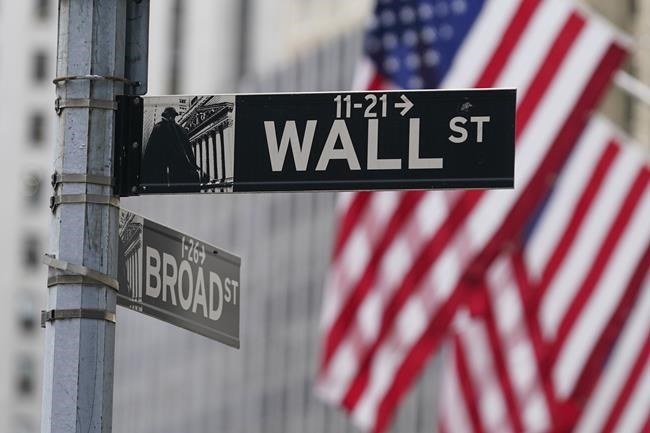NEW YORK — Stocks closed lower on Wall Street as traders return from a long holiday weekend. The S&P 500 fell 0.4% Tuesday. The index is coming off its second weekly gain. The Dow lost 0.6% and the Nasdaq slipped 0.1%. Crude oil prices rose. Markets are looking ahead to a quieter week with company earnings reports winding down and just a trickle of government economic reports expected, including data on manufacturing, layoffs and trade. DocuSign, GameStop, Dave & Buster’s and Kroger are set to report their most recent quarterly financial results this week.
THIS IS A BREAKING NEWS UPDATE. AP’s earlier story follows below.
Stocks are edging lower on Wall Street in afternoon trading Tuesday as traders return from a long holiday weekend to face a relatively quiet week.
The S&P 500 fell 0.2%. The index is coming off its second weekly gain. The Dow Jones Industrial Average lost 95 points, or 0.3%, to 34,741 as of 2:55 p.m. Eastern. The Nasdaq was up 0.1%.
Markets in the U.S. were closed Monday for the Labor Day holiday.
Industrial stocks has some of the steepest losses. Union Pacific fell 2.1%. Technology stocks gained ground. Microsoft rose 1.6%.
Energy stocks rose along with crude oil prices after Saudi Arabia and Russia said they will extend their voluntary production cut of 1 million barrels of oil a day through the end of the year. U.S. crude oil prices rose 1.3% and Chevron rose 1.4%.
Investors have a few economic reports to look forward to this week and the latest round of corporate earnings is essentially finished.
“There's not much going on other than investors doing the mental arithmetic over whether the Federal Reserve will or will not continue to hike interest rates,” said Sam Stovall, chief investment strategist at CFRA.
The Institute for Supply Management releases its latest report on the U.S. services sector Wednesday. The services sector employs most Americans and is a big component of the economy. Its health could provide more insight into how inflation is affecting consumer spending.
Wall Street will also get updates on aspects of the manufacturing sector and consumer credit. DocuSign, GameStop, Dave & Buster’s and Kroger are set to report their most recent quarterly financial results this week.
Last week, investors were busy reviewing a heavy load of economic data as they try to get a better picture of the economy. Much of the information fueled hopes that the Fed might moderate interest rate increases to fight inflation, which has been easing for months.
Bond yields rose Tuesday. The yield on the 10-year Treasury, which influences interest rates on mortgages and other loans, rose to 4.26% from 4.18% late Friday. The yield on the 2-year Treasury, which tracks expectations for the Fed, rose to 4.95% from 4.88%.
Wall Street expects the Fed to hold its benchmark interest rate steady at its next meeting later in September, just as it did at its previous meeting. Investors are mostly betting that the central bank will maintain that pause through the rest of the year.
The central bank has raised its main interest rate aggressively since 2022 to the highest level since 2001. The goal has been to rein inflation back to the Fed’s target of 2%. Several measures of inflation have gotten closer to that target and the economy is still growing. That has alleviated concerns about the aggressive rate hikes pushing the economy into a recession.
Analysts are still concerned about the potential for a recession, but those concerns have lessened as inflation cools and the economy remains resilient.
Markets in Europe and Asia were mixed. Hong Kong’s benchmark fell 2.1%, as investors sold real estate shares which have gained recently following government efforts to support the ailing industry.
——
Elaine Kurtenbach and Matt Ott contributed to this report.
Damian J. Troise And Alex Veiga, The Associated Press



